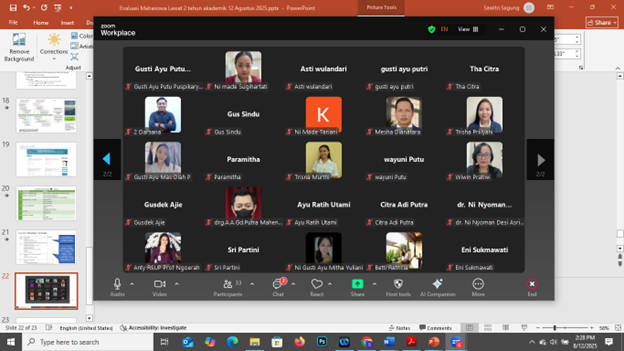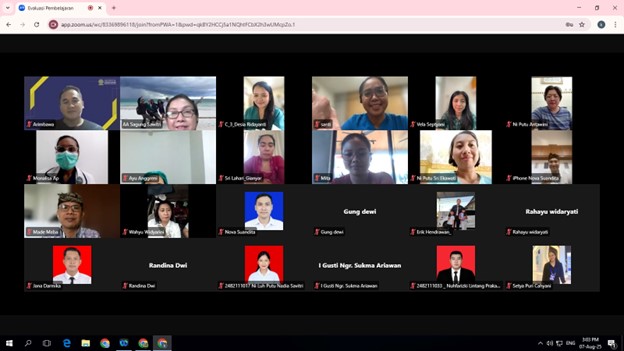Enhancing Field Epidemiology Education: A Collaborative Effort to Improve FETP Learning Quality Across Indonesia
On May 19, 2025, a regular meeting of Field Epidemiology Training Program (FETP) organizers was held across various universities in Indonesia to enhance the learning quality for students. The meeting began with welcoming remarks from Dr. Endah Kusumowardani, M.Epid, the Head of the Early Warning Surveillance Team, who provided updates on the FETP program in Indonesia. Additionally, Rebecca D. Merrill, PhD, MHS, Country Director of U.S. CDC Indonesia, also shared insights into the role of the CDC in supporting FETP.
Representatives from the seven universities offering the FETP program in Indonesia, including Udayana University, presented updates on their FETP offerings. The Udayana University delegation included Dr. dr. Anak Agung Sagung Sawitri, MPH and Dr. Putu Cintya Denny Yuliyatni, MPH, who manage the FETP program at Udayana. Their presentation, along with those from other universities, covered a range of topics, such as curriculum development, the ratio of field-based to classroom learning, the field learning process, and monitoring and evaluation of the program. Key discussions also addressed the graduation rates, career opportunities for alumni, and the challenges each university faces in delivering FETP education. After each presentation, there was a session for questions and answers, fostering a collaborative exchange of ideas.
A significant part of the meeting focused on the Internal Continuous Quality Improvement (CQI) process, which regularly performed. The group decided that the presentations from each university would serve as the basis for CQI materials, with additional data to be requested from each institution to improve the quality assurance process.
Another important topic discussed was the Standard Operating Procedure (SOP) for deploying FETP students and lecturers during emergency situations requiring epidemiological expertise. The meeting highlighted past experiences in which students were deployed during significant health events such as the earthquake in Nusa Tenggara Barat, landslides and earthquakes in Palu, the polio outbreak in Aceh and East Java, and the anthrax outbreak in East Java. Based on these experiences, the need for a clear and structured SOP was emphasized to ensure that future deployments are more effective and beneficial for all parties involved.
The final part of the meeting involved a discussion of the challenges faced in delivering field epidemiology education. Recommendations were made to improve the quality of field assignments, which were divided into three main groups: Surveillance & Scientific Communication, PE KLB & Scientific Communication, and Epidemiology Studies & Scientific Communication.
This event reflects the ongoing evaluation and improvement of the field epidemiology learning process within the MPH Program at Udayana University. Through the involvement of various stakeholders, including FETP Indonesia, field mentors from health departments across seven provinces in Indonesia, and academics from the seven universities offering FETP, a harmonious relationship between the users and implementers of the FETP education process was evident. Additionally, the support from the CDC Indonesia further strengthens the program’s ability to offer a standardized international approach to public health education. This collaboration is expected to produce graduates who are not only well-prepared for fieldwork but also skilled and internationally competitive.
By integrating these best practices and collaborative efforts, the FETP program aims to ensure that students are not only equipped with theoretical knowledge but also possess the practical skills and global standards necessary to address public health challenges, both locally and internationally.




MEDICAL FACULTY